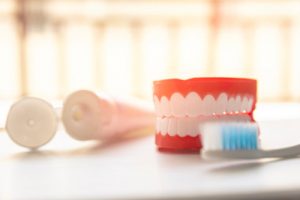As you age, taking care of your teeth and dental health becomes even more important. Many people think that dentures are something that everyone will have to have one day. But, your teeth are designed to last a lifetime, but this is only the case if you work to take care of them.
With age, your body, hormones, and mouth changes. The nerves within your teeth become smaller, which can make your teeth more prone to cavities or other dental issues. Three quarters of people over the age of 65 retain cat least some of their natural teeth However, many suffer higher rates of gum disease, oral cancer, dental decay, mouth infections, and tooth loss.
This guide will help to explain how aging can impact your dental health, as well as, ways to work towards better dental health.
Menopause and Dental Health
Menopause brings about many changes within a woman’s body. One of which is the changing hormone levels. After menopause women are more susceptible to periodontal disease. A large part of this is due to a deficiency of estrogen that can result in bone loss and inflammation.
But it is possible to diagnose periodontal disease early, to help prevent fractures and tooth loss.
It is also common for women to experience oral discomfort during menopause. You may experience symptoms such as dry mouth, painful mouth, or even burning mouth syndrome. These are often associated with a reduced salivary flow rate that could become even worse with partial dentures.
Aging and Dental Health

Another common concern with age is dry mouth effect 30 percent of patients that are over the age of 65 and 40 percent of patients that are over 80 years of age.
With age, you are also at an increased risk for root caries due to an increased gingival recession that can expose the root surface of the teeth as well as medications that may be taken due to dry mouth. Around 50 percent of patients over the age of 75 have root caries that affect at least one tooth.
The risk of cavities is even greater the older you get. The rate of tooth decay within people over the age of 65 is now greater than those in childhood. Gum tissue naturally recedes with age, so that the soft root of the tooth can become exposed. While there is not much you can do to prevent the natural receding gum line, there are things that you can do to help prevent cavities.
Tips to Maintain Dental Health with Age
Regular dental exams can help to combat these issues as they arise, but if you do not make the time for dental visits these problems can turn into bigger issues. By adopting healthy habits in your life you can help your teeth to last a lifetime.
Here are a few tips to help improve your oral health:
Brush twice a day with a soft bristled toothbrush. An electric toothbrush can help make this process even easier.
Clean between your teeth with dental floss, a water pic, or another flossing tool.
If the water in your local area is safe to drink from the tap, drink tap water. Most contain fluoride. This can help to prevent tooth decay.
If you wear dentures, make sure to clean them daily. Take your dentures out of your mouth for at least four hours daily.
Quit smoking. Smoking puts you at a greater risk for gum disease, tooth decay, and tooth loss.
Don’t skip out on your dental exams. See your dentist regularly to help maintain the best oral health that you can.





